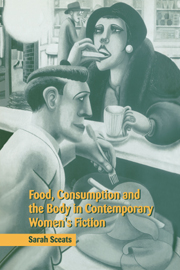Book contents
- Frontmatter
- Contents
- Acknowledgements
- Introduction
- Chapter 1 The food of love: mothering, feeding, eating and desire
- Chapter 2 Cannibalism and Carter: fantasies of omnipotence
- Chapter 3 Eating, starving and the body: Doris Lessing and others
- Chapter 4 Sharp appetites: Margaret Atwood's consuming politics
- Chapter 5 Food and manners: Roberts and Ellis
- Chapter 6 Social eating: identity, communion and difference
- Conclusion
- Notes
- Bibliography
- Index
Chapter 4 - Sharp appetites: Margaret Atwood's consuming politics
Published online by Cambridge University Press: 22 September 2009
- Frontmatter
- Contents
- Acknowledgements
- Introduction
- Chapter 1 The food of love: mothering, feeding, eating and desire
- Chapter 2 Cannibalism and Carter: fantasies of omnipotence
- Chapter 3 Eating, starving and the body: Doris Lessing and others
- Chapter 4 Sharp appetites: Margaret Atwood's consuming politics
- Chapter 5 Food and manners: Roberts and Ellis
- Chapter 6 Social eating: identity, communion and difference
- Conclusion
- Notes
- Bibliography
- Index
Summary
The perspective of the first part of this book has been largely personal, focused on the individual psyche or body, or on how cultural influences and power relations affect the individual. This chapter begins to open out that view by considering the cumulative effect of a single writer's use of food, eating and appetite, how they embody her particular vision and sense of engagement. Highly distinctive and widely varied in form and content, Margaret Atwood's writing spans and reflects themes and pre-occupations discussed throughout this book, from predatory cannibalism to self-starvation and the body, the force of conventions and the significance of foods.
In a 1982 interview, Atwood said: ‘Politics, for me, is everything that involves who gets to do what to whom … Politics really has to do with how people order their societies, to whom power is ascribed, who is considered to have power.’ ‘Everything that involves who gets to do what to whom’ is pretty comprehensive. Clearly Atwood, like Carter, considers herself to be an essentially political writer, one for whom politics suffuses all activities. She has said more or less as much in several interviews. By looking right across her work it is possible to put together a picture of how food, eating and appetite in her fiction relate to ‘how people order their societies’, on micro (individual, interpersonal) and macro (cultural) levels, not just in specific instances, but woven into an overall political analysis or vision.
- Type
- Chapter
- Information
- Publisher: Cambridge University PressPrint publication year: 2000



